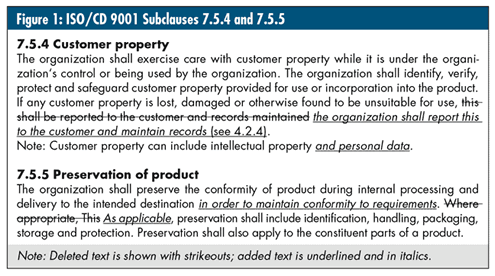Now's Your Chance to Shape Your Future
In my March 2007 column ("How Do You Change a Good Thing? Slowly!"), I reported that the International Organization for Standardization is in the process of drafting an amendment to ISO 9001:2000 and a major revision to ISO 9004:2000. This work has reached the stage of an initial committee draft (CD), which is now circulating beyond Working Group 18 of ISO/TC 176, Subcommittee 2, the group responsible for drafting the changes. The American Society for Quality has made the drafts available to the public; PDF versions can be downloaded by going to www.asq.org/quality-press/index.html. Nonmembers of ASQ need to become "registered customers" at the e-Retail checkout page to receive the drafts. For this initial committee draft, the downloads are free.
For ISO 9001, the committee draft includes changes in about 30 areas. Some are simply needed updates to references or other editorial changes. The others, in my opinion, are all clarifications, and none are intended to change the requirements. The examples shown in figure 1 illustrate the type of changes that are proposed in the committee draft.

In both cases, the proposed text reads much better. Of course, there are more drafts ahead, and wording may change. If the current direction is sustained, the 2009 version of ISO 9001 should be almost identical in requirements to the current version but should be more easily understood.
As I mentioned in the March column, the changes to ISO 9004 are much more dramatic. The committee draft even proposes a new title: "Managing for sustainability--A quality management approach." The notion of sustained organizational success or performance has been an underlying idea behind the drafting work. One of the key goals for the ISO 9004 revision is to develop a document that can help organizations use quality management processes to sustain business success. This has proven to be quite a challenge. One reason for the difficulty is that there's no complete and single set of ideas, notions or processes that can be relied upon to drive ongoing success in every type of organization. Thus, if no perfect model exists, we're left with ongoing cycles of change and improvement. Describing the process and tools for sustainable improvement without writing a textbook-size document has been difficult. Initial working drafts really did read more like a collection of handbook chapters than a useful standard. The current committee draft is better, but it still needs a lot of work.
There remains an objective of maintaining ISO 9001 and ISO 9004 as a "consistent pair" of quality management system standards so that ISO 9001 users can easily refer to ISO 9004 to improve their systems. One consistency feature that ISO/CD 9004 doesn't preserve from ISO 9004:2000 is the inclusion of the full text of ISO 9001. This feature made using ISO 9004 easier, but it also drove the ISO 9004:2000 draft committee to adopt almost the exact same format as for ISO 9001:2000. So, although it's intended to maintain consistency, the format of the revised ISO 9004 is likely to be somewhat different from that of ISO 9001.
The schedule for completing the project looks like this:
• CD 1 for comments issued February 2007
• CD 2 for comment and ballot in 2007 or 2008
• Draft international standard for comment and ballot in 2008
• Final draft international standard for final vote in 2009
• Issue of completed standards in 2009
In 2009 we should have a new version of ISO 9001 that's easier to understand and use. We should also have an ISO 9001 companion version--ISO 9004--that will truly help address organizational success.
John E. (Jack) West is a consultant, business advisor and author with more than 30 years of experience in a wide variety of industries, and is a past chair of the U.S. TAG to ISO/TC 176.
|